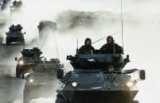I am very upset by the commitment of Canada to an impossible NATO mission in Afghanistan, now projected for five or even ten years into an undetermined future. At the moment the official commitment is only until 2009, but government reiterates that Canada will not cut and run — see: PM Stephen Harper at the UN 21/9/2006, Afghan President Hammid Karzai in Ottawa, 22/9/2006.
Meanwhile as casualties rise, an abundant crop of opium poppies still nourishes the narco-economy, corruption abounds at all levels of state, while Taliban, al Qaeda ("the Base"), unlimited arms and money pass through porous frontiers with impunity.
NATO Supreme Allied Commander General James Jones (U.S.) has called for additional commitments of troops, helicopters, and transport planes for battle in the dangerous Kandahar region where Canadian forces are deployed. Canada, with 2200 troops in the country, has now pledged to increase effectives to 2500.
Afghanistan is now the source of 92% of illegal opium in the world. UN Office on Drugs and Crime 2 September 2006, reported in NYT 20 September 2006
NATO Supreme Allied Commander General James Jones (U.S.) has called for additional commitments of troops, helicopters, and transport planes for battle in the dangerous Kandahar region where Canadian forces are deployed (with British and Dutch). Canada, with 2200 troops in the country, has now pledged to increase effectives to 2500.
A Provincial Reconstruction Team (PRT) of 250 Canadian soldiers is working to restore the authority of the central government in Kabul, as well assisting the rebuilding of essential infrastructure. Taliban and their supporters melt away, blending into the local population in the aftermath of combat — they are virtually undetectable without help.
Chief of Defence Staff General Rick Hillier arrived in Afghanistan on 28 September 2006 to inspect the southern sector in the aftermath of Operation Medusa vs Taliban insurgency.
CTV's Paul Workman, reporting from Kandahar, said Hillier addressed the daily challenges faced by Canadian troops. "He spoke of the difficulties in fighting the Taliban, an enemy that can blend into the villages, uses guerrilla tactics, suicide bombs and bombs buried on the side of the roads," Workman told CTV Newsnet.
"He said it's very difficult for Canadians to deal with that and you just can't go into the villages and start shooting indiscriminately."
ctv.ca news 29/9/2006
The cost to Canada of Afghanistan so far has been $2.3 billion (Sept. 2001-May 2006). Ongoing military expenditure there, in men and equipment, is enormous, a considerable drain on available resources. Another $1 billion in development aid has been pledged over the next 10 years.
ctv.ca news 22/9/2006
Public opinion of the mission expressed in numerous polls has been increasingly unfavourable. Decima Research found that 59% of respondents agreed that Canadian soldiers "are dying for a cause we cannot win", while just 34% disagreed. Results were generally similar across the country.
[current poll taken 8-18 September 2006; Toronto Star from CP, 2/10/2006]
Several deaths have been caused by so-called "friendly fire".
How well are these forces presently equipped and supported for the difficult terrain and conditions of guerrilla warfare?
A UN report has suggested links between Iraqi and Afghan guerillas. New types of bombs that are used in Iraq show up soon later in Afghanistan.
NYT, 8/10/2006
Toronto Star reporting from Kandahar:
"Two Canadian soldiers died yesterday and two were wounded in an ambush of rocket-propelled grenades and gunfire as they guarded a road that has become a prime target for insurgent attacks. ... The Canadians were attacked while patrolling an unfinished four-kilometre road to link the Panjwaii district about 20 kilometres west of Kandahar with a main highway. Soldiers in the region say there just aren't enough of them properly to clear the area of insurgents who've stepped up attacks since a major three-week offensive against the Taliban last month was declared a success by NATO. Six Canadians have died along the unfinished road or the 16-square-kilometre area around it since late September."
[TS, from CP, Reuters, 15/10/2006]




0 comments:
Post a Comment